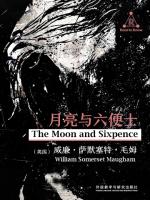I Do Have Dreams
安莘
The Moon and Sixpence, a novel written by William Somerset Maugham,
narrates a life that seems absurd of an ordinary man but truly talented
artist who abandons a nice and cosy family suddenly just for painting
from a writer’s perspective. As the narrator put it, Strickland was
possessed of a evil, a primitive force. So going far away and pursuing
his dreams, eventually he steps on the land of a corner island away from
all the world--Tahiti, South Pacific and is destroyed by Leprosy in the
end. He never cares about the hardship of life all along. It sounds
really ridiculous that a comfortable middle-aged man leaves coziness for
unrealistic fate-calling of empty talk, which is the biggest
contradiction in this novel. Based on this, Maugham tells of dream and
reality, art and society ,nature and reason, in concert with moon and
sixpence. What I see as a real ending is that Strickland is a genius
than ever. So when in a realistic society full of so-called money and
numb dogma, do not forget the natural zeal in your heart. After
travelling through Tahiti, Maugham returned to Europe and indited The
Moon and Sixpence. Though taking Paul Gauguin as prototype, I can not
grasp a concrete characteristic of Strickland. Compared with other
personae, he is more like a carrier of an ideology without normal
emotion only satyr remains. Strickland, his works and the deep
significance of writer show a tormented spirit striving for the release
of expression, a nature force. He is cruel, selfish,brutal and sensual
while a great idealist, narrator put it. He is a brave man suffering
torture and despair between primacy and civilization but to choose exile
to dreams, I think. Another character impresses me deeply is Stroeve,
who strives for the “moon” but ends with “sixpence”. This is a nice
opposites of Strickland. It shows a reality I guess that some are born
to be a thing but others devoting whole life can not be. Besides,
Maugham, from third-person perspective, uses a little strange way to
tell. It seems that the narrator is assimilated with Strickland to
invent much to account for the change of heart and human nature ,
because of which covers a gauze to the novel. The instinct is to take an
interest in the singularities of human nature so absorbing that the
moral sense is powerless against it. I’d like to talk about dreams
after finishing reading.Dream, in my view, is a primitive force born
with you, which is equal to writer’s. As you get older and know more,
the force exiting deeply in the soul grows and gradually controls your
mind and body. I do have dreams, however, there are more realities.
Similar to Stroeve, we must learn that some are born with noting,
neither material or spirit. That is saying that “if you look on the
ground in search of a sixpence, you don not look up, and so miss the
moon.” I pick up the sixpence, then look up for the moon. While admiring
braveness and greatness of Strickland, we might find the connection
between dream and reality and the balance between wildness and reason as
well. The most importance is to know there do have moon as long as you
look up.So, look up!



 京公网安备 11010802032529号
京公网安备 11010802032529号